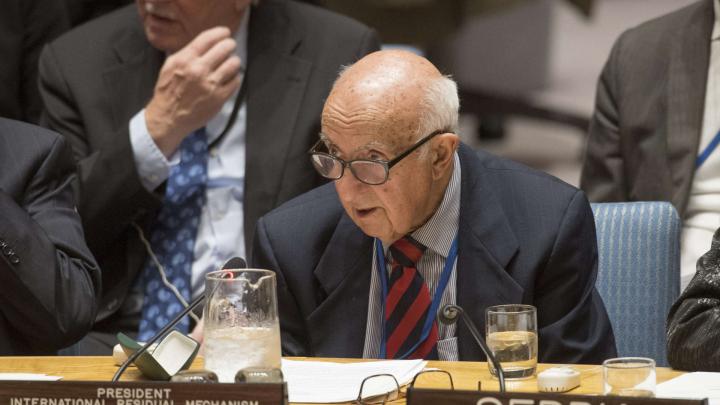President Meron updates UN Security Council on progress of work
The President of the Mechanism for International Criminal Tribunals (Mechanism or MICT), Judge Theodor Meron, today presented the Mechanism’s latest progress report to the United Nations Security Council.
The President began his address by acknowledging the work and achievements of the International Criminal Tribunal for the former Yugoslavia (ICTY) and its contribution to strengthening fundamental principles of international humanitarian and human rights law. Lauding the ICTY’s legacy, President Meron said that he was particularly honoured to act “together with my colleagues at the Mechanism, as a guardian of this legacy as we carry out and bring to their conclusion the essential residual functions of both the ICTY and its sister Tribunal, the ICTR.”
Turning to the work of the Mechanism, President Meron reported that the MICT is in a period of heightened judicial activity, with two major ongoing appeals in the Radovan Karadžić and Vojislav Šešelj cases, the retrial in the Stanišić and Simatović case and a number of additional ad hoc judicial matters. In this regard, the President reported that an appeal hearing in the Šešelj case is scheduled for 13 December 2017, and an appeal judgement is expected in the first part of 2018. Furthermore, an appeal hearing in the Karadžić case is expected by the end of the second quarter of 2018 and an appeal judgement in that case by late 2019. President Meron also recalled that any appeal filed in the Ratko Mladić case would come within the jurisdiction of the Mechanism.
The President further informed the Council that the review hearing in the Ngirabatware case is currently scheduled for 8 to 16 February 2018 and is expected to mark “the first judicial proceedings to be conducted in the courtroom at the Mechanism’s new premises in Arusha, representing another important milestone for the Mechanism”.
With regard to one of the residual functions taken over by the MICT - the supervision of sentences imposed by the International Criminal Tribunal for Rwanda (ICTR), the ICTY and the Mechanism - President Meron announced that four prisoners are expected to be transferred from the UN Detention Facility in Arusha to the custody of the authorities of Senegal today. Moreover, negotiations with several Member States concerning the enforcement of sentences of the remaining six prisoners awaiting transfer in Arusha are currently at an advanced stage. President Meron shared his hope and expectation that, within the coming year, all ICTR prisoners will have been transferred to enforcement States, “which would represent a major step towards completion of our mandate in this area”.
In closing, President Meron expressed his gratitude to UN Member States for their invaluable support to the Mechanism, recalling that the timely and efficient completion of the Mechanism’s mandate depends upon the “ongoing support given by this Council, its Members, and the international community, and on the commitment of all concerned to preserving the legacy of both the ICTY and the ICTR.”

The President of the Mechanism for International Criminal Tribunals (Mechanism or MICT), Judge Theodor Meron, today presented the Mechanism’s latest progress report to the United Nations Security Council.
The President began his address by acknowledging the work and achievements of the International Criminal Tribunal for the former Yugoslavia (ICTY) and its contribution to strengthening fundamental principles of international humanitarian and human rights law. Lauding the ICTY’s legacy, President Meron said that he was particularly honoured to act “together with my colleagues at the Mechanism, as a guardian of this legacy as we carry out and bring to their conclusion the essential residual functions of both the ICTY and its sister Tribunal, the ICTR.”
Turning to the work of the Mechanism, President Meron reported that the MICT is in a period of heightened judicial activity, with two major ongoing appeals in the Radovan Karadžić and Vojislav Šešelj cases, the retrial in the Stanišić and Simatović case and a number of additional ad hoc judicial matters. In this regard, the President reported that an appeal hearing in the Šešelj case is scheduled for 13 December 2017, and an appeal judgement is expected in the first part of 2018. Furthermore, an appeal hearing in the Karadžić case is expected by the end of the second quarter of 2018 and an appeal judgement in that case by late 2019. President Meron also recalled that any appeal filed in the Ratko Mladić case would come within the jurisdiction of the Mechanism.
The President further informed the Council that the review hearing in the Ngirabatware case is currently scheduled for 8 to 16 February 2018 and is expected to mark “the first judicial proceedings to be conducted in the courtroom at the Mechanism’s new premises in Arusha, representing another important milestone for the Mechanism”.
With regard to one of the residual functions taken over by the MICT - the supervision of sentences imposed by the International Criminal Tribunal for Rwanda (ICTR), the ICTY and the Mechanism - President Meron announced that four prisoners are expected to be transferred from the UN Detention Facility in Arusha to the custody of the authorities of Senegal today. Moreover, negotiations with several Member States concerning the enforcement of sentences of the remaining six prisoners awaiting transfer in Arusha are currently at an advanced stage. President Meron shared his hope and expectation that, within the coming year, all ICTR prisoners will have been transferred to enforcement States, “which would represent a major step towards completion of our mandate in this area”.
In closing, President Meron expressed his gratitude to UN Member States for their invaluable support to the Mechanism, recalling that the timely and efficient completion of the Mechanism’s mandate depends upon the “ongoing support given by this Council, its Members, and the international community, and on the commitment of all concerned to preserving the legacy of both the ICTY and the ICTR.”